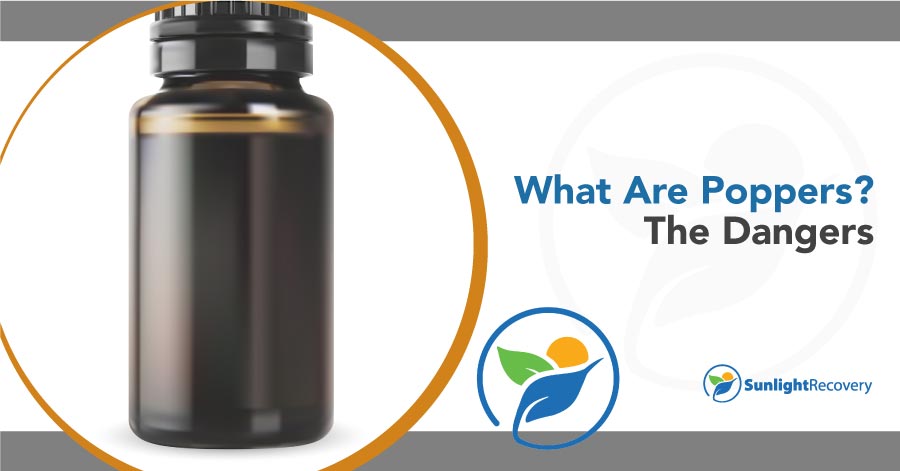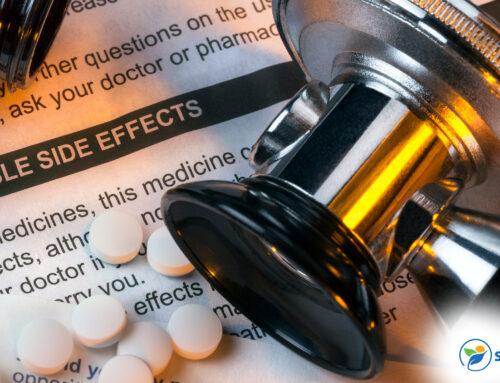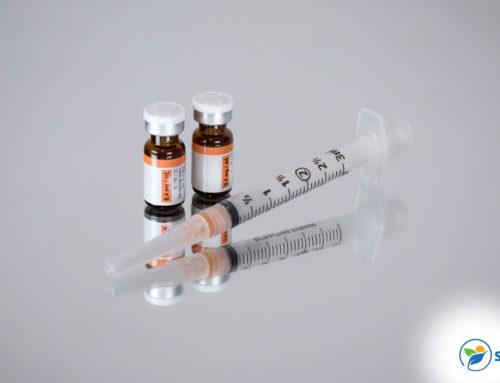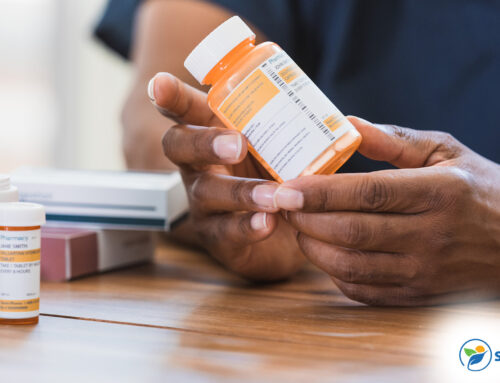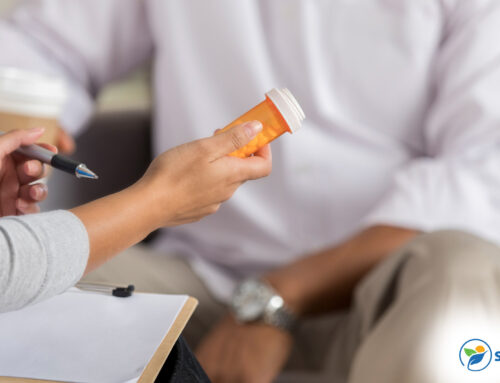Updated June 12, 2023
Poppers have been around since before the U.S. Civil War, and, according to the National Institute of Health, an estimated 3% of adults have consumed at least one popper in their life. Individuals in the gay male community are most at risk of using the drug. This blog post defines what is a popper, describes the physical effects of its usage and offers resources to help popper users overcome this dangerous habit.
What Is a Popper?
Popper is the street name for a recreational drug made from a chemical class called alkyl nitrites. Key specific ingredients may include the chemicals butyl nitrate, isobutyl nitrite or isopropyl nitrite. This drug is a liquid that emits a gas that the user can inhale, resulting in a quick-hitting but short-lasting high. Poppers get their name because they’re packaged in a small, sealed bottle, and when the bottle cap is removed, the user hears a “pop” sound.
What Is the History of Poppers?
Alkyl nitrite was first discovered by doctors in 1844 and was originally used to relieve chest pain (angina). By the 1960s, the medical use of alkyl nitrites declined due to safety concerns. In 1969, the Food and Drug Administration outlawed over-the-counter purchases of alkyl nitrites for medical use. In reaction, manufacturers began to market this chemical for non-medical use as room deodorizers, leather polish and tape head cleaners. During the 1970s, poppers became a popular party drug in big-city nightclubs. This resulted in their recreational use expanding greatly.
Today, poppers are still sold online and in adult novelty stores as non-FDA-approved energy shots and sexual enhancers. Popular brand names include Rush, Jungle Juice, Locker Room and Iron Horse. Without FDA approval, it’s difficult to know what’s in poppers, and the key nitrate ingredient may vary (i.e., chemicals such as alkyl, amyl, butyl, isobutyl or isopropyl).
The Cultural Perception of Poppers
In popular culture, poppers are primarily viewed as a “gay drug.” The drug is known to relax muscles, making certain sex acts less painful and more enjoyable. The explosion of recreational use of poppers in the 1970s occurred primarily in the bars, nightclubs and bathhouses of the gay male community. Today, gay men continue to be at the highest risk of using this drug. According to the National Institute of Health, 35% of gay men have tried poppers at least once in their life versus just 4% of heterosexual males.
What Are the Physical Effects of Poppers?
Alkyl nitrites are known in the medical community as vasodilators, which means they quickly dilate blood vessels in the body. As the vessels open wider, blood flow and heart rate increase. This gives popper users a feeling of warmth, euphoria and light-headedness.
Poppers can also relax smooth, involuntary muscles around the body, including the throat, anus and vagina. This relaxation can make certain sexual activities easier, and some users say the drug increases sexual sensations and intensify orgasms.
Poppers are very quick to act, and users can feel the effects within seconds. However, the effects also end within seconds or minutes.
Are Poppers Safe?
Poppers are never safe to use and should be avoided altogether, if possible. Those who choose to use poppers need to be mindful of the particular risks they pose and the specific circumstances in which these dangers are more likely to occur, causing potentially harmful effects.
Taking Too Much, Too Quickly
Poppers are known to affect people as soon as they’re taken, causing an immediate high that lasts for a few minutes. The intensity of the high and the duration of the facts can depend on how much you’ve taken, and you may be left with a headache, dizziness, difficulty breathing, coordination loss, or even an unexpected allergic reaction.
Chemical Burns from the Liquid in Poppers
The liquid in poppers is a poisonous substance and can irritate and chemically burn your skin as well as lead to blindness, organ failure, and death. It’s also highly flammable, which means you risk serious burns if you combine it with smoking.
Mixing Poppers with Other Drugs/Medications
Mixing medications, alcohol, or other recreational drugs with poppers can increase their overall risk. Some combinations can be fatal, such as taking poppers with medications intended for erectile dysfunction.
The Possibility of an Overdose
It’s possible to overdose on poppers, especially since people sometimes repeatedly use them to extend their short highs. Symptoms of an overdose may include:
- Sudden sniffing death syndrome
- Asphyxiation due to an inadequate supply of oxygen to tissues
- Nausea, choking, and vomiting
What Are the Dangers of Poppers? Can You Overdose on Poppers?
It’s certainly possible to overdose on inhalant drugs such as poppers. According to the National Institute of Health, between 100 to 200 deaths are caused each year by inhaling drugs these type of drugs.
According to the FDA, poppers stimulate the cardiovascular system, causing unnatural fluctuations in blood pressure and heart rate. As a result, popper users are at increased risk of heart attacks, strokes and severe drops in blood pressure. The most concerning side effect of using poppers is death caused by “sudden sniffing death syndrome.” This is a severe heart attack that can occur without warning in an otherwise healthy person.
Using poppers interferes with the hemoglobin in the blood, which can cause difficulty breathing, as well as reduces the amount of oxygen being delivered to critical organs. A lack of oxygen in the lungs can cause asphyxiation, and vomiting after use can cause users to choke.
Poppers come in liquid forms and the desired gas is emitted from that liquid. The liquid itself can cause chemical burns to the skin. One sign of a frequent popper user is chemical burns around their mouth and nose. The liquid isn’t supposed to be ingested and can cause fatal poisoning if it’s swallowed.
Serious health conditions can occur if poppers are used at the same time as prescription drugs such as Viagra and blood pressure controllers. Even mixing poppers with alcohol can cause dangerous drops in blood oxygen levels.
Finally, reduced inhibitions and increased blood flow may also increase the risk of spreading sexually transmitted diseases, such as HIV.
Are Poppers Addictive?
The chemical in poppers isn’t known to be physiologically or physically addictive. However, like most recreational drugs, the use of poppers can be habit forming. Popper users are at risk of developing a habit where they consume poppers every time they socialize at a nightclub or a similar venue where poppers are prevalent.
Frequent popper users may develop a tolerance to the drug. This means they need to consume larger dosages to keep feeling the same desired effects. Also, the fact the drug leaves the system so quickly can encourage users to take multiple dosages at once and/or take the drug several times within a night.
Are You Concerned About Abuse of this Drug?
If you or a loved one consumes poppers, it’s important to make life changes to end this dangerous habit. If your popper usage is frequent and severe, then you may need professional help to recover. The counselors and medical staff at Sunlight Recovery are available 24/7 to help start the journey to recovery. Contact us now at (888) 402-3647 to learn more about our drug addiction recovery programs, including programs specific to inhalant abuse.


